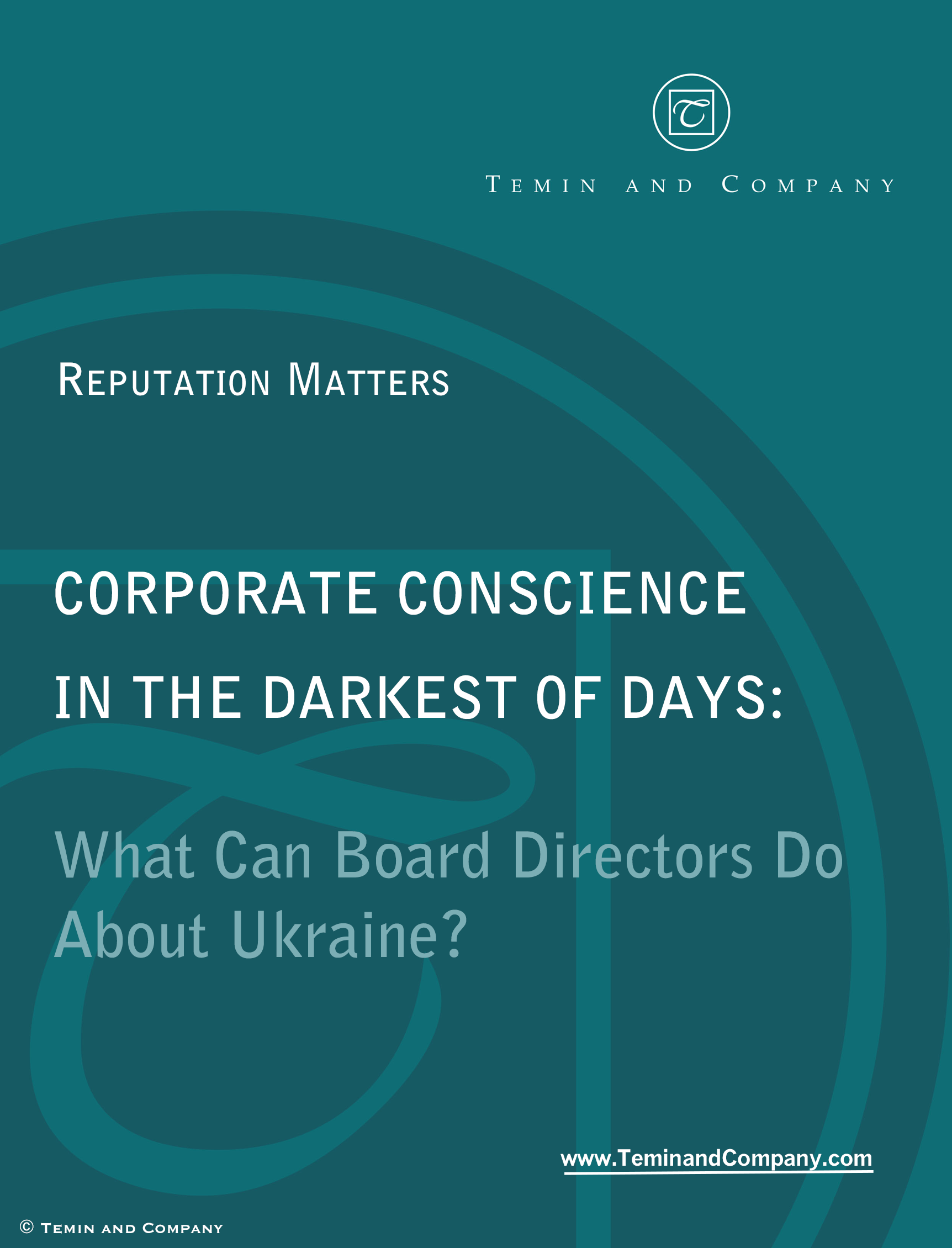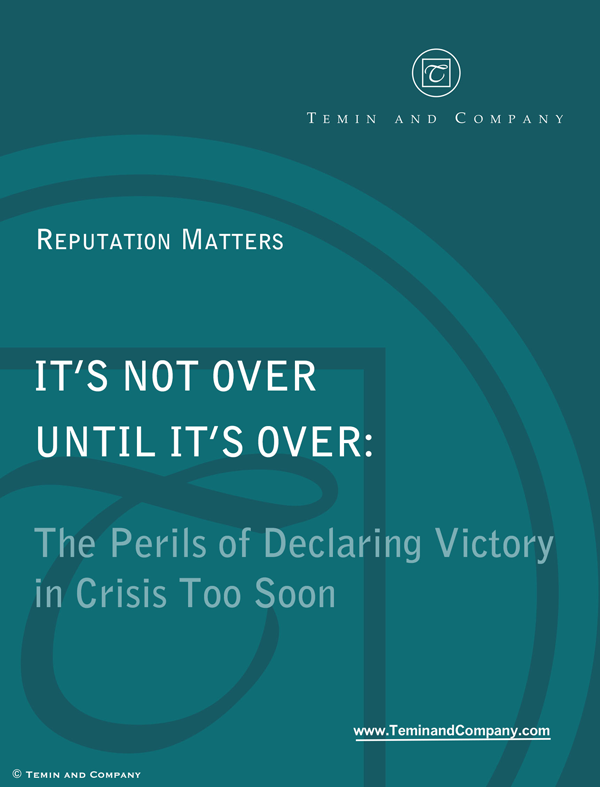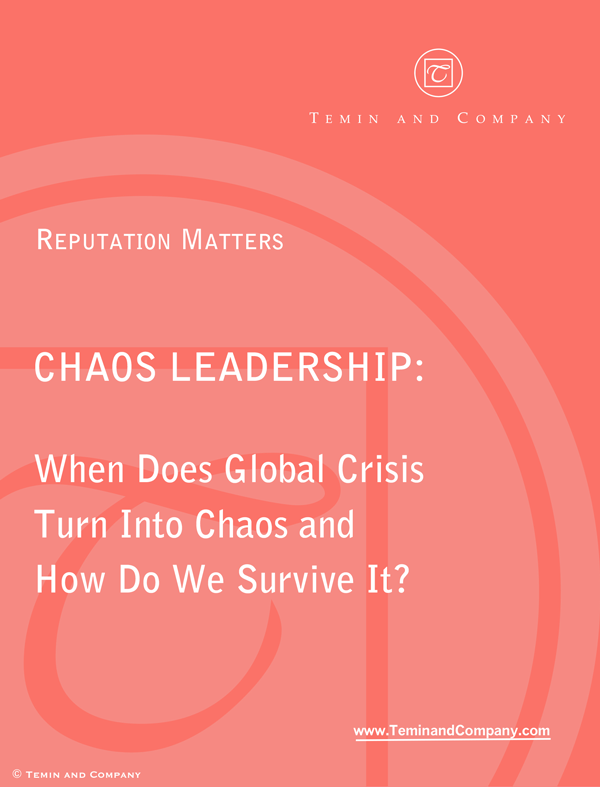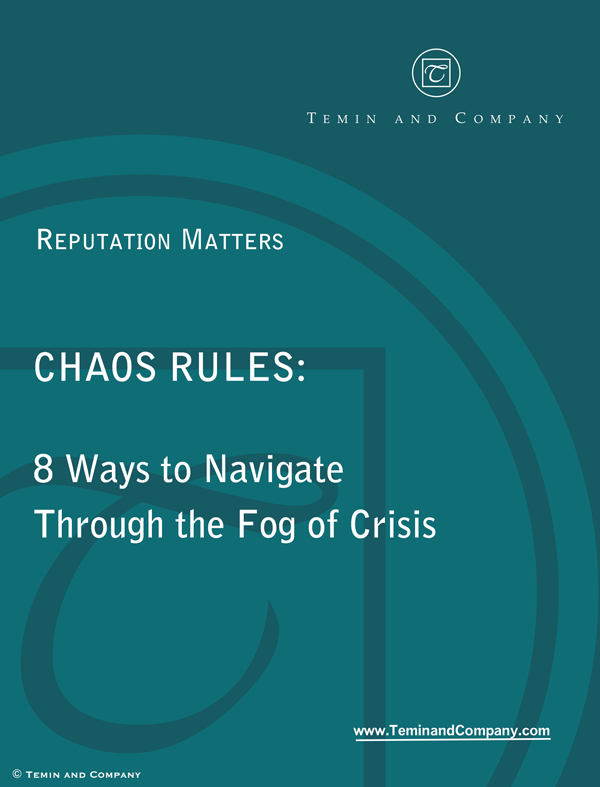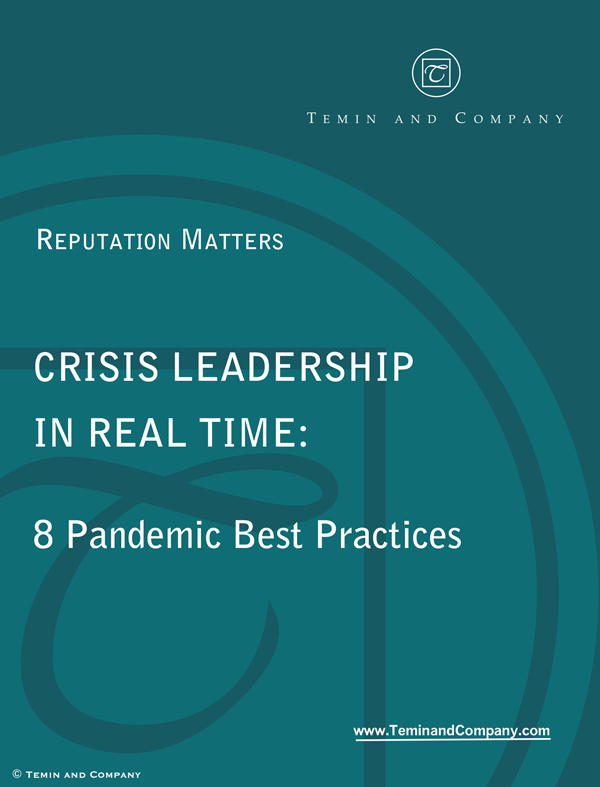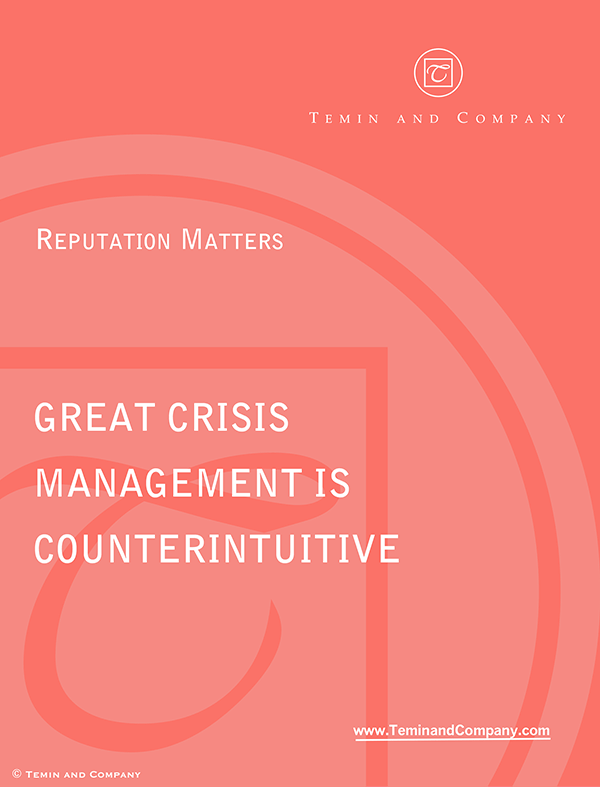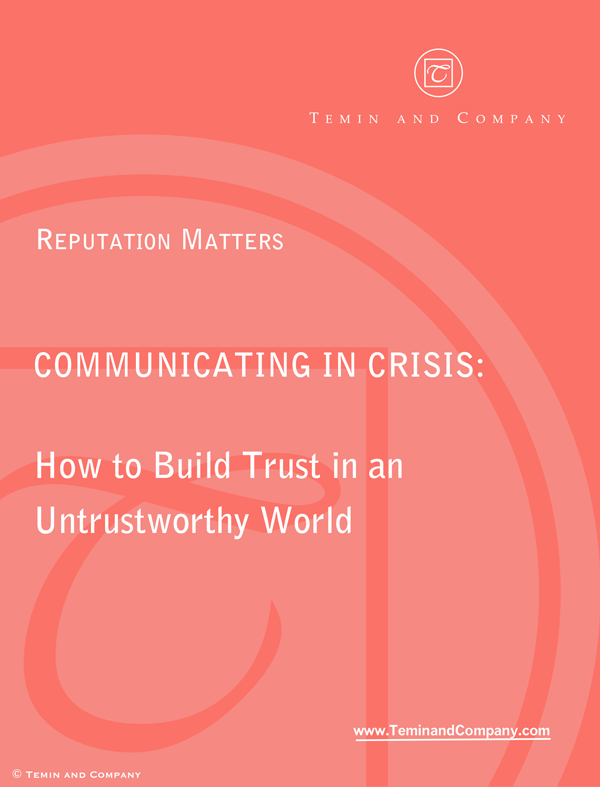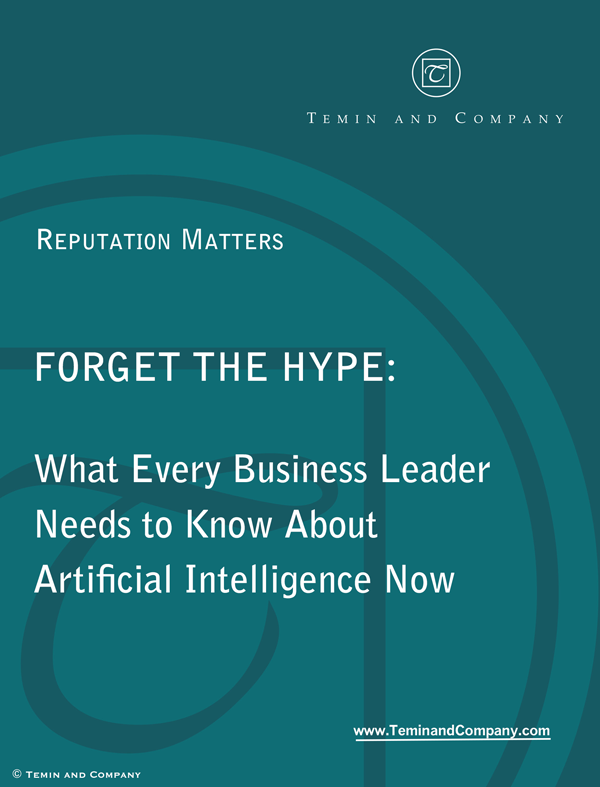Thought Leadership–Crisis Articles
White Papers»
"Reputation Matters" White Papers seek to offer deeper insight on a wide range of topics we help clients address.
Communicating In Crisis: How To Build Trust In An Untrustworthy World
Leadership, “Reputation Matters,” Forbes, March 4, 2020
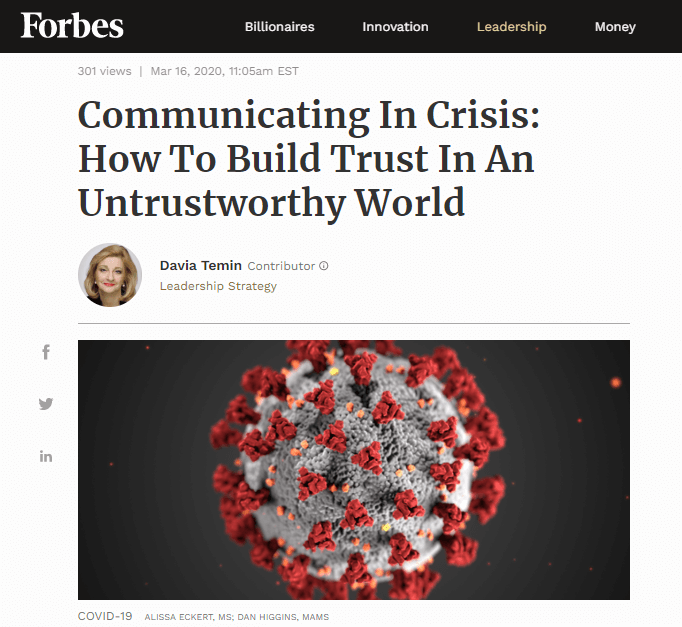
As we enter the first full week of the global pandemic and crashing financial markets, we are all looking for who to listen to, and who to believe.
We’re looking for a trusted voice in the storm to help guide us, one that can steer us toward the truth as it unfolds, and away from lies and misstatements, be they well-meaning or malicious. This is the leaders’s task — to provide that “True North” to employees, community, customers, investors, and stakeholders.
But this is an almost impossible task in such a topsy-turvy landscape, where it can be impossible to distinguish sky from ground.
Sequestered — quarantined by choice or fiat, or simply avoiding exposure by working from home — our choices for who to listen to have changed. No more can we comfortably sit across from our boss in a group meeting and use all of our senses to tell whether he or she is telling us the whole truth. Working remotely, half of the sensors we are used to using are missing.
And while we’re incredibly lucky to have video and teleconferences, podcasts and webinars, live streaming, virtual chat rooms, and virtual galas, salons, board meetings and policy meetings — still that personal touch is missing, and with it many of the clues we use to determine integrity and truthfulness.
So who do we trust? And how can leaders establish trust? […read more]
Crisis Leadership In Real Time: 8 Best Practices For Public Healthcare Emergencies
Leadership, “Reputation Matters,” Forbes, March 4, 2020
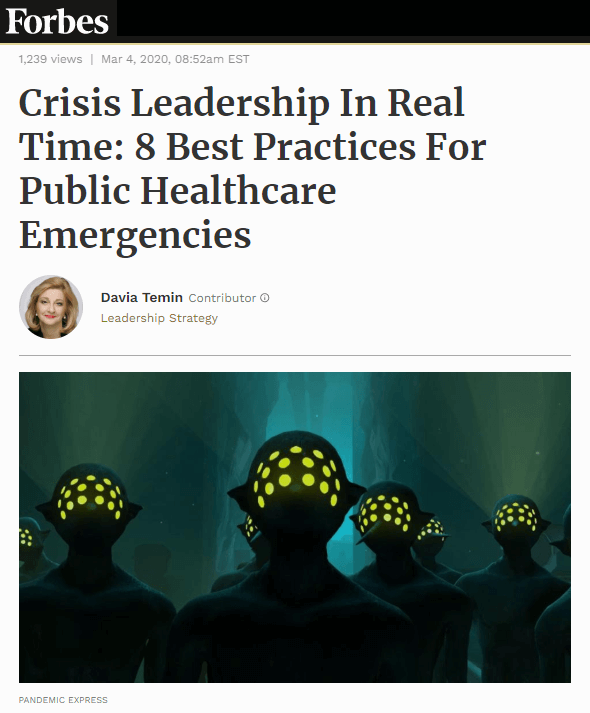
So, it’s here. We now have a public healthcare crisis in front of us that is already disrupting global markets, businesses, and lives, and has the potential to do much more damage. Or not, depending upon who you are, and what and who you believe.
Just as with the climate crisis, while the facts are the facts, how we respond to the COVID-19 crisis says more about who we are, and how we lead, than it does about the crisis itself.
So, it’s probably a good time to begin recasting more generic crisis management rules into a specific set of rules for our current challenge. Whether the current Coronavirus crisis is ever dubbed a pandemic or not, we surely need to develop some advanced thinking on how to deal with it.
Following is a new set of 8 pandemic ‘best practices,’ for your consideration. […read more]
Great Crisis Management is Counter-Intuitive: That’s Why Boeing, Wells Fargo Are Getting It So Wrong
Leadership, “Reputation Matters,” Forbes, April 7, 2019
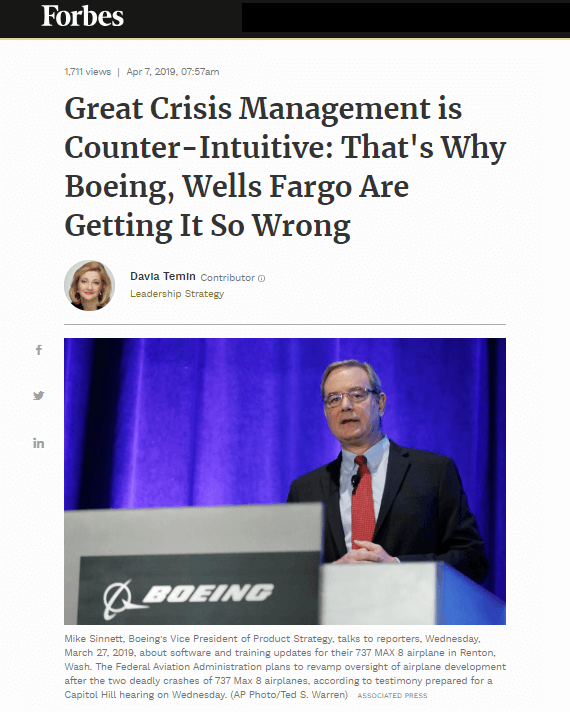
It’s easy to be a Monday morning quarterback, especially for huge companies facing huge problems. But too many companies, like Wells Fargo and Boeing, are getting it all wrong time and time again.
The stakes for their failure – doing the wrong things in crisis and not understanding why – are too high. And consumers, investors, partners, and stakeholders are suffering the consequences. Why the blind spots? Why the inability to get it right when crisis hits?
Why Companies Are Getting Crisis Response So Wrong
The core reason that so many big companies, who should know better, fail in crisis is because the best crisis management is counter-intuitive, sometimes even illogical, and they absolutely do not understand that.
So they listen to the wrong people, consider only partially the impact and ramifications of their actions, ignore emotion or the zeitgeist of the moment, reflexively make the wrong decisions, dig themselves into holes, and then are loathe or incapable of digging themselves out again. […read more]
When the CEO Has To Go
Davia Temin, Directors & Boards, Fourth Quarter 2018
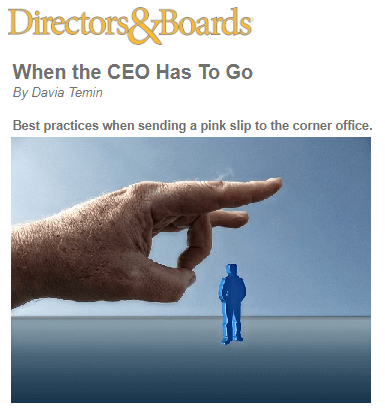
With the explosion of the #MeToo Movement, CEOs – like other executives – are being accused of sexual harassment or inappropriate behavior more than ever before. And after an investigation, if found guilty, more are being shown the door.
Our Temin “#MeToo Index,” which has cataloged all of the serious allegations since December, 2015 (when Bill Cosby was first arrested), has logged accusations against 32 public company CEOs or presidents, and 18 nonprofit CEOs or presidents to date. Approximately 89% of those accused have either resigned or retired, or were fired or suspended. Approximately 30% were fired outright.
But one of the most challenging tasks for any board is firing its CEO. […read more]
The Right Way To Handle A CEO Scandal
Davia Temin, Corporate Board Member, 2018
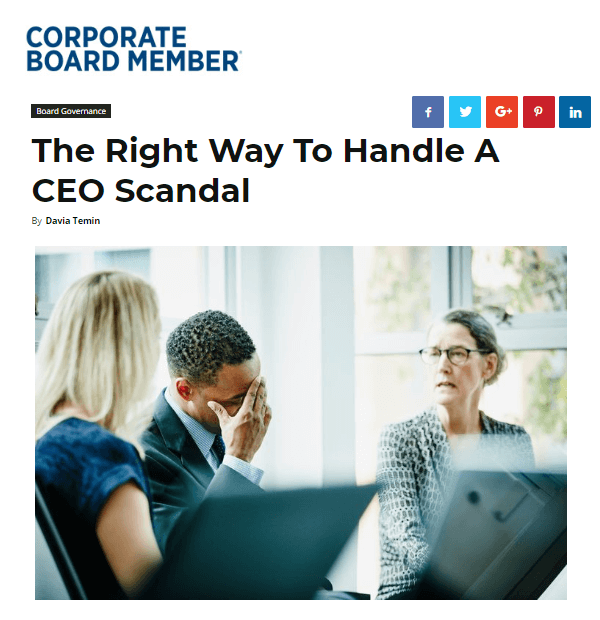
It used to be that a founding CEO could be excused all manner of misbehavior by his or her board, as long as it was kept quiet and the bottom line was not negatively impacted. In my 20 years as founder and CEO of a boutique crisis management firm, I have dealt with well over 60 cases of CEO dismissal, and an equal number of case where the CEO did not get dismissed. It used to be that the board might either tolerate bad behavior, or publicly support a CEO while privately chastising him relentlessly. Regardless, he or she would stay.
More recently, however, given the outsized attention to serious CEO misbehavior, boards really have little choice—they must react, and act, quickly and decisively. In the brave new world of 24-hour news cycles and social media commentary that transits the globe at the speed of light, no CEO is invulnerable or—once found to be guilty of ethical violations—irreplaceable. […read more]
The Facebook Mess: The Difference Between Commissioning And Acting On Opposition Research
Leadership, “Reputation Matters,” Forbes, November 30, 2018
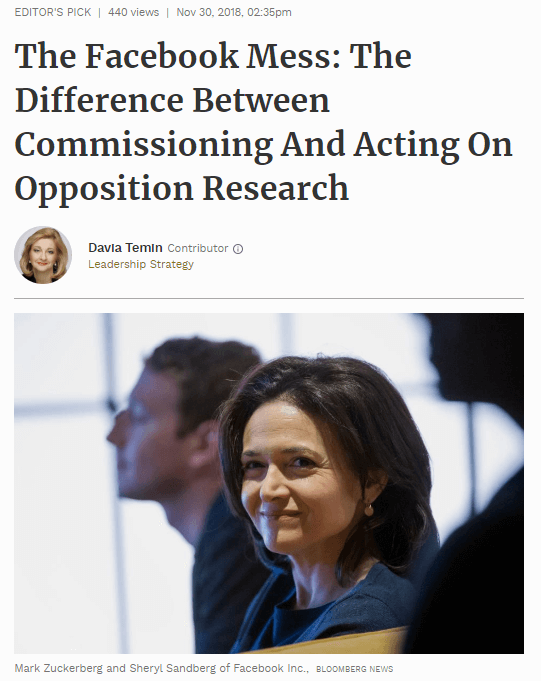 Not everything that Facebook has done lately is wrong. So, let’s try to sort out the prudent from the feckless before we all jump on the “kill Facebook” bandwagon. Due Diligence vs. Opposition (Oppo) Research Organizations commission in-depth research on their competitors and perceived adversaries all the time: it’s called due diligence. In fact, it could be argued that a company or non-profit is not doing their job if they don’t seek to understand deeply those who invest in them, comment on them, compliment them, and criticize them. That is simply looking for more information, motives, ulterior motives, and doing the proper due diligence that their stockholders and stakeholders would expect them to do. Good strategy would dictate that they can not be expected to fly blind in a firestorm, if they can help it. On this level, there is absolutely nothing wrong — in my opinion as someone who has been active in creating public strategies for private and public organizations for a long time — with Facebook’s commissioning “oppo” research into George Soros after he excoriated tech companies at Davos. You know what: every good professional would, or should have, done the same thing. […read more]
Not everything that Facebook has done lately is wrong. So, let’s try to sort out the prudent from the feckless before we all jump on the “kill Facebook” bandwagon. Due Diligence vs. Opposition (Oppo) Research Organizations commission in-depth research on their competitors and perceived adversaries all the time: it’s called due diligence. In fact, it could be argued that a company or non-profit is not doing their job if they don’t seek to understand deeply those who invest in them, comment on them, compliment them, and criticize them. That is simply looking for more information, motives, ulterior motives, and doing the proper due diligence that their stockholders and stakeholders would expect them to do. Good strategy would dictate that they can not be expected to fly blind in a firestorm, if they can help it. On this level, there is absolutely nothing wrong — in my opinion as someone who has been active in creating public strategies for private and public organizations for a long time — with Facebook’s commissioning “oppo” research into George Soros after he excoriated tech companies at Davos. You know what: every good professional would, or should have, done the same thing. […read more]
When Masters Of The Universe Fall – How Facebook Committed The 7 Deadly Sins Of Crisis Management
Leadership, “Reputation Matters,” Forbes, November 16, 2018
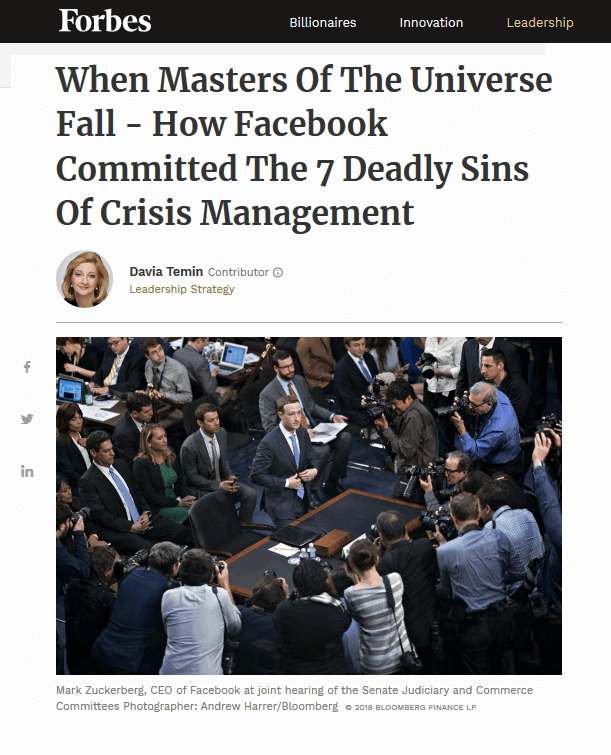
Wall Street’s Investment Bankers used to be called the Masters of the Universe, but that seems so last millennium now. As the mantle of unbridled self-confidence and ego has moved westward, many new “Tech Masters” have surpassed their predecessors in over-confidence, over-estimation of how powerful they are, and in how badly they can get things wrong. Crisis, of course, ensues.
Facebook showcases the whole issue. Every industry and every generation feels invulnerable as long as everything is going their way. And the behemoth that Mark Zuckerberg built has led the pack. But when a fall from grace comes, as it has come for Facebook (through their own mistakes says yesterday’s blockbuster New York Times article Delay, Deny, Deflect: How Facebook Leaders Leaned Out in Crisis), it shakes the world. At least the cyber world, and all who live or visit there.
Crisis demands the ability to see clearly, the humility to admit mistakes readily, and the courage to do whatever it takes to fix those mistakes immediately. If you can’t do this, you are committing one or more of the 7 deadly cardinal sins of crisis management. Facebook, it turns out, has committed all 7. […read more]
How Should Men Accused of #MeToo Offenses Respond?
Leadership, “Reputation Matters,” Forbes, September 14, 2018
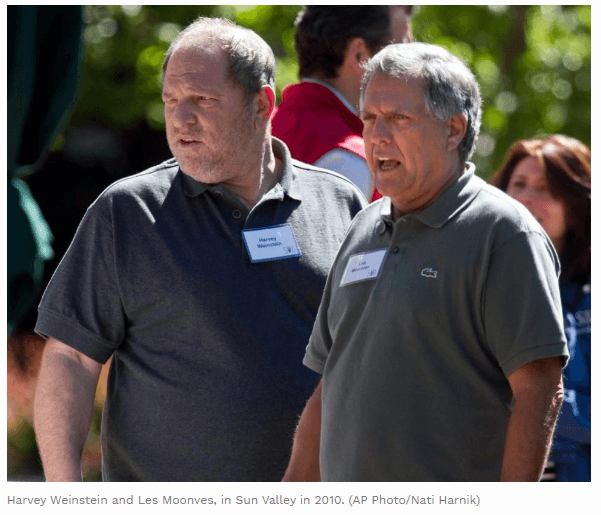
What would have happened last year if—upon hearing of Harvey Weinstein’s sexual harassment debacle and forced exit from the company he created—CBS CEO Les Moonves had decided to take a radically different path?
What if—knowing that a police report was being filed against him, and that news of it and other abuses he had never admitted to was inevitably going to come out in the current environment—he had chosen to come clean instead of continuing to stonewall? In fact, what would have happened if he had come clean long before?
While this is not the crisis advice one would necessarily give, as the #MeToo movement marches on we need to find some new strategies not only for curtailing abusive behavior, confronting it and making reparation but also for potentially modeling how one might recover honorably. […read more]
Les Moonves Makes No. 700 On The #MeToo Index (And Jeff Fager Is 701)
Leadership, “Reputation Matters,” Forbes, September 12, 2018
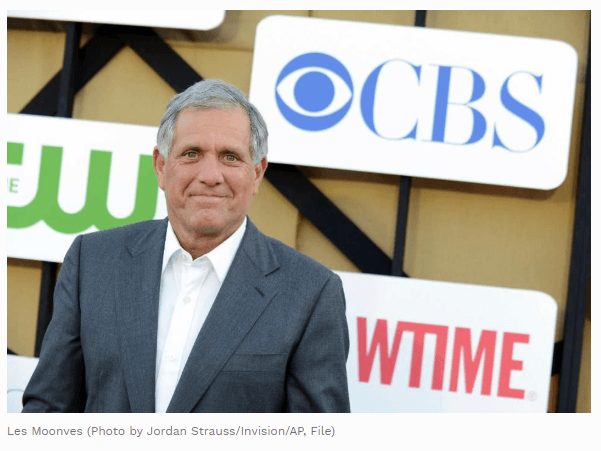
Just in case any of us thought that the #MeToo phenomenon was a flash in the pan, the ouster of CBS CEO Les Moonves and 60 Minutes Executive Producer Jeff Faber, the latest high-profile public figures to be felled as the movement continues, has proven otherwise. As our tally of public figures accused of sexual harassment, or other #MeToo violations, continues to climb, the mighty and the mousy, the sacred and the profane are being called to account. The numbers tell us that the movement has both momentum and staying power.
Les Moonves makes 700, and Jeff Fager 701. […read more]
BankThink How to save a bank’s reputation
Davia Temin, American Banker, June 28, 2018
![]()
From #MeToo to lending to gunmakers, from compliance issues to cyberhacks, from questionable marketing practices to persistent gender inequality — political, economic, and social issues are all directly impacting bank operations and reputations like never before.
Moreover, the rules appear to be changing in real time. Where the “Boom Boom Room” was an aberration that took a long time to be taken seriously and then addressed, today almost any whiff of sexual harassment will find bankers on the curb in a nanosecond, as the public’s tolerance for such behavior is plummeting.
Yet new studies are telling us that even after a crisis of major proportions, most companies’ share price returns to normal valuation in months. (Note how quickly Equifax rebounded after its massive hack.)
So, what is the difference between a reputational hit that ends up being just a blip, and one that becomes an extinction level event? Following are five ways to assess your exposure. […read more]
White Papers»
"Reputation Matters" White Papers seek to offer deeper insight on a wide range of topics we help clients address.




